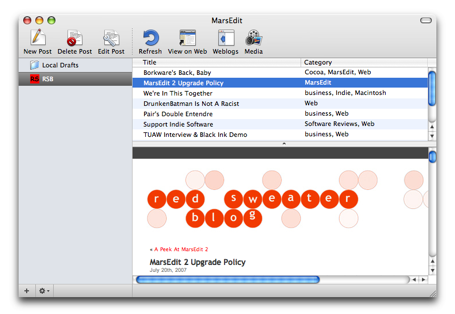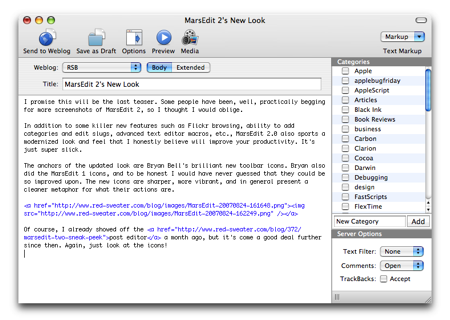September 4th, 2007
Wow … I thought I’d try something new this time and release a product in “the wee hours.” So I put all the pages up live late last night, thinking they would be there in case anybody saw them.
Then the little “cash register” noise on my email started going off. Nice! The reaction to the public release was almost immediate, so I couldn’t go to sleep quite as instantly as planned. When I finally did grab some shuteye, I woke up to a world on fire with MarsEdit joy!
Err, let’s just say, people were ready for this upgrade, and so far, they seem to be really loving it.
Read the What’s New page for MarsEdit 2, to get a sense for what the major changes are in this revision.
Visit the MarsEdit Home Page to download a copy if you haven’t tried it yet!
I’m really excited to be able to share the app with all of you, after several months of hard work.
Posted in Business, MarsEdit | 25 Comments »
August 26th, 2007
Drew Thaler has put together a pair of scripts for streamlined use of Markdown in MarsEdit, when the blog server is not configured to automatically process Markdown for presentaton.
Markdown Scripts For MarsEdit
With Drew’s scripts, you can write a post entirely in Markdown, then easily convert it to HTML before sending it to your weblog. He also provides a reverse script so you can edit existing posts by first converting them to Markdown, editing them, and converting them back before republishing. Nifty!
This is a really cool example of a MarsEdit user taking good advantage of the scripts menu to extend the application’s functionality. As you might imagine, I get a lot of requests from users who want to see a particular feature added to MarsEdit. I love it when the feature can be sort of “prototyped” as a proof of concept with AppleScript. I could see functionality like what Drew has put together being incorporated into the standard distribution of MarsEdit at some point. As development moves forward for 2.1 and beyond, I am going to aim for making the app even more user-extensible, because that’s where the most exciting ideas comes from. It’s ideal when users can not only come up with the idea but also implement a working example!
If you’re interested in Markdown but not using a weblog server that supports it natively, Drew’s scripts might make a nice addition to your MarsEdit configuration!
Posted in AppleScript, MarsEdit | Comments Off on Markdown Scripts For MarsEdit
August 24th, 2007
I promise this will be the last teaser. Some people have been, well, practically begging for more screenshots of MarsEdit 2, so I thought I would oblige.
In addition to some killer new features such as Flickr browsing, ability to add categories and edit slugs, advanced text editor macros, etc., MarsEdit 2.0 also sports a modernized look and feel that I honestly believe will improve your productivity. It’s just super slick. The UI feels even cleaner and more streamlined than the original MarsEdit. Because it is even cleaner! I also thought carefully about (mostly) invisible things, like organization of the menu bar items, and added a healthy dose of contextual menu functionality. In general, the usability of the application is greatly improved, over what was already a pretty darned usable app.
Oh, and it also looks amazing.
The anchors of the updated look are Bryan Bell’s brilliant new toolbar icons. Bryan also did the MarsEdit 1 icons, and to be honest I would have never guessed that they could be so improved upon. The new icons are sharper, more vibrant, and in general present a cleaner metaphor for what their actions are.

Of course, I already showed off the post editor a month ago, but it’s come a good deal further since then. Again, just look at the icons!

What I can’t really express with a picture is how much fun it is to just show and hide the options side-panel. I love the tactile feeling of the animation as the text scrunches up or expands to fill the space. I could just open and close the options pane all day. Except of course, then I’d never ship this thing.
Posted in MarsEdit | 27 Comments »
August 23rd, 2007
Many of this blog’s readers know the name Mark Dalrymple. Why? Because he’s the author of some of the best technical literature available on the subject of programming Macs. Targeting readers from the getting started to the deep nitty-gritty ends of the developer spectrum, Mark’s writing is a great gift to the Cocoa (and low-level Mac-Unix!) community.
Mark also writes a blog. The Borkware Miniblog has long been on my subscription list, but I’ve noticed his output ramping up lately. No doubt it’s thanks in part to his recent adoption of MarsEdit! Mark started a new WordPress blog to facilitate the move, as he writes in his “First Post“:
I’m moving the Borkware Miniblog to WordPress, mainly so I can use the most excellent Red Planet MarsEdit editor. Web forms just don’t do it for me any more.
Amen to that, Mark! It’s great to have you on the Red Planet.
A lot of people I know (especially developers!) tell me that they would use MarsEdit, if only they blogged more. My answer to this chicken-n-egg question is almost always the same. “If you used MarsEdit, you would blog more.” At least, that’s how it works for me. It’s great to see it works that way for others, as well. Quotes like Mark’s inspire me to keep working on the app. Because if I can save yet another developer from the painful clutches of the web form, it’s all worth it!
Posted in Cocoa, MarsEdit, Web | 2 Comments »



